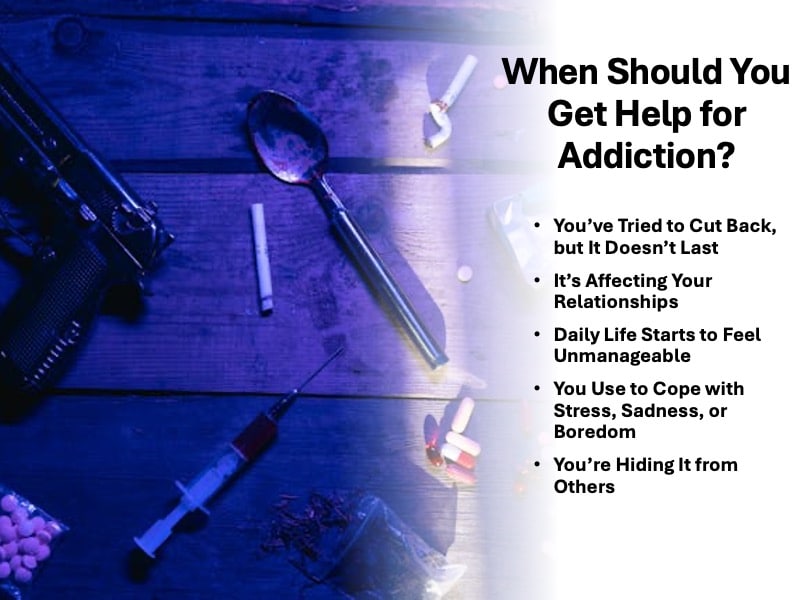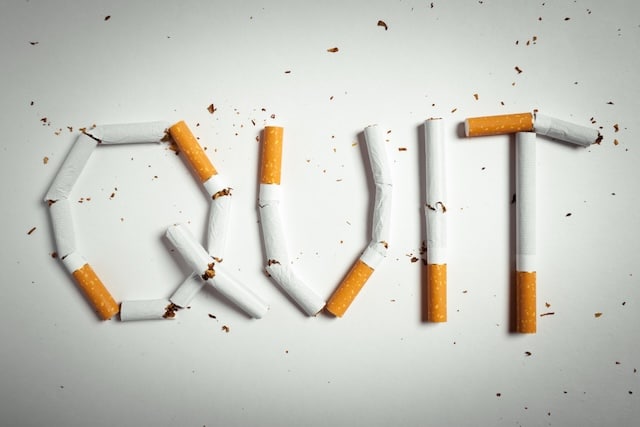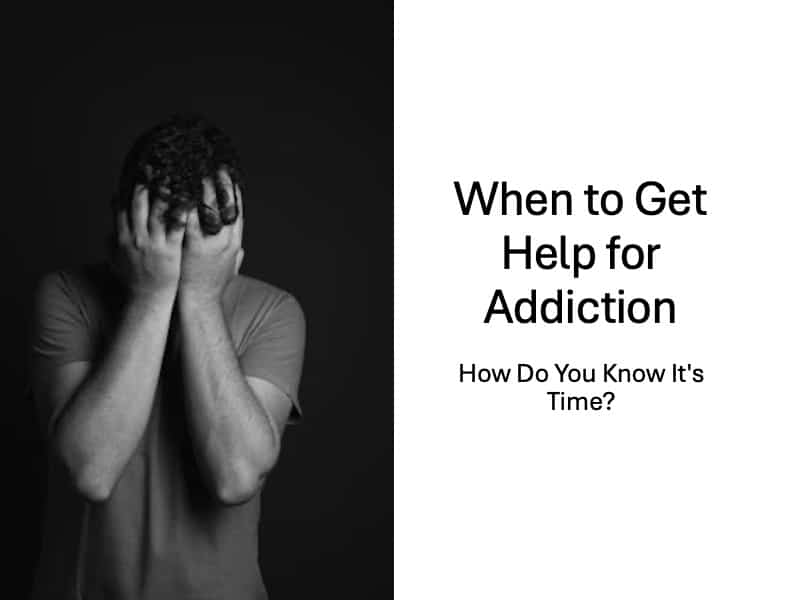When to Get Help for Addiction: How to Know It’s Time?
Knowing when to get help for addiction isn’t always clear.
For many people, substance use begins as a way to relax, fit in socially, or cope with everyday stress.
Over time, though, casual use can become compulsive, isolating, and difficult to stop, often long before someone considers it “severe enough” to need professional treatment.
In the United States, nearly 49 million people aged 12 and older had a substance use disorder (SUD) in 2022, according to the Substance Abuse and Mental Health Services Administration (SAMHSA).
Among those, only a fraction sought or received the help they needed, highlighting how often early signs are missed or ignored (SAMHSA).
Unfortunately, addiction rarely looks the way we expect.
It doesn’t always involve dramatic consequences, like legal trouble or financial collapse.
More often, it’s a slow erosion of control, self-trust, and well-being.
Recognizing these subtle but powerful shifts is a crucial step in recovery, and it can help you or someone you love avoid hitting rock bottom.
Whether you’re worried about yourself or someone else, learning when to get help for addiction could be the most important turning point in your journey toward healing.
What Type of Help is Available for Addiction Recovery?
Recovery from addiction is not one-size-fits-all.
The right treatment depends on the severity of use, co-occurring mental health conditions, personal preferences, and lifestyle needs.
Fortunately, there are several evidence-based paths to recovery, and each is designed to help individuals regain control and restore wellness in different ways.
For those seeking a more exclusive and comfortable environment, a luxury drug rehab offers an upscale approach to treatment.
Detoxification Programs (Medical Detox)
Detoxification is often the first step in recovery, especially for substances that cause physical dependence, like alcohol, opioids, or benzodiazepines.
Medical detox programs offer 24/7 supervision by trained clinicians who manage withdrawal symptoms safely and reduce the risk of complications.
For individuals with moderate to severe substance use disorders, detox provides a structured and supportive environment to stabilize the body before beginning therapy or rehab.
Inpatient or Residential Rehab
The options for rehab are far more vast than people realize.
From Legacy Healing Center and its luxury drug rehab options to finding a meeting in your area that recommends budget options, there are options for residential stays that can give you time, which is often exactly what you need.
Here is some more information on the options.
- Inpatient Rehab: Inpatient rehab involves living at a treatment facility for several weeks to months, depending on the program. These intensive programs combine individual therapy, group counseling, medical care, and life-skills training.
- Residential Rehab: Residential rehab is particularly helpful for individuals with a long history of substance use, co-occurring mental health disorders, or unstable home environments. It removes daily distractions and provides a strong therapeutic foundation for recovery.
Outpatient Treatment Programs
Outpatient care allows individuals to live at home while attending treatment sessions during the week. This includes:
- Standard Outpatient Programs (OP)
- Intensive Outpatient Programs (IOP)
- Partial Hospitalization Programs (PHP)
Outpatient options are ideal for those who need flexibility for work, school, or family responsibilities, but still require structured support and therapy.
Behavioral Therapy and Counseling
Therapy is a central part of addiction recovery. It
helps uncover the emotional triggers, beliefs, and behaviors that drive substance use. Evidence-based therapies include:
- Cognitive Behavioral Therapy (CBT)
- Dialectical Behavior Therapy (DBT)
- Motivational Interviewing (MI)
- Contingency Management
These approaches improve emotional regulation, stress tolerance, and relapse prevention, which are key skills for long-term success.
Medication-Assisted Treatment (MAT)
MAT combines medications with counseling and behavioral therapy to treat substance use disorders, especially opioid and alcohol addiction.
Common FDA-approved medications include:
- Buprenorphine and methadone (for opioid use)
- Naltrexone (for both alcohol and opioids)
- Disulfiram and acamprosate (for alcohol use)
MAT reduces cravings, minimizes withdrawal symptoms, and improves retention in treatment programs (Office of Addiction Services & Supports, New York).
Support Groups and Peer Recovery
Programs like Alcoholics Anonymous (AA), Narcotics Anonymous (NA), and SMART Recovery offer peer-led, judgment-free spaces for individuals to share experiences and maintain accountability.
These support groups have helped countless individuals overcome alcohol dependence by providing an opportunity for honest dialogue, shared understanding, and mutual encouragement.
They also help develop a sense of community, reduce feelings of isolation, and support long-term sobriety.
Many people continue attending meetings for years after formal treatment ends, demonstrating the value of a supportive peer network.
Dual Diagnosis Treatment
When addiction coexists with mental health disorders like depression, anxiety, PTSD, or bipolar disorder, integrated care is critical.
Dual diagnosis programs treat both conditions simultaneously to reduce the risk of relapse and improve overall functioning.
This is especially useful when dealing with problems such as substance-induced anxiety disorder.
These programs use trauma-informed care and psychiatric support to help individuals heal both emotionally and physically.
When Should You Get Help for Addiction?

It’s easy to dismiss warning signs or tell yourself things aren’t “that bad yet.”
But waiting for a rock-bottom moment often causes more harm than healing.
The truth is, addiction rarely follows a predictable timeline, and the best time to seek help is often long before things spiral completely out of control.
Important: You don’t need to hit a crisis point to justify getting support.
If substance use is affecting your relationships, daily responsibilities, mental health, or self-worth, those are clear indicators that help is not only appropriate, it’s necessary.
Recognizing those shifts early can lead to faster recovery, fewer complications, and a significantly greater chance of long-term success.
You’ve Tried to Cut Back, but It Doesn’t Last
One of the biggest warning signs is trying to quit or cut back but not being able to stick with it.
Maybe you’ve told yourself, “This is my last drink,” or “I’m done after today,” but the cycle repeats.
That’s more common than people think.
You might feel fine for a few days or weeks, only to fall back into the same pattern.
This doesn’t mean you’re weak or broken; it means your body and brain may have built a dependency.
At this point, it’s not just a habit. It’s something that likely needs medical and emotional support.
Some of the best rehab centers in California and other areas of the United States are designed for people in this exact situation.
Going to rehab offers a safe, structured space with professional care, so you’re not doing it alone.
Programs range from detox and therapy to long-term recovery support.
Many centers also offer personalized plans tailored to your lifestyle and needs.
It’s Affecting Your Relationships
Addiction doesn’t just impact the person using, it often hurts the people around them.
If your relationships with family, friends, or your partner feel strained, it might be time to look closer.
- Are people expressing concern about your behavior?
- Have you had arguments about your drinking or drug use?
- Maybe you’ve started hiding your habits or pulling away from people you care about?
When substance use creates tension, trust issues, or emotional distance, that’s a strong sign that help is needed.
You don’t have to figure it out on your own; support programs often involve loved ones and focus on rebuilding those connections in healthy ways.
Daily Life Starts to Feel Unmanageable
If your substance use is affecting your everyday life, that’s another key sign.
It might show up in subtle ways, such as being late for work, skipping meals, or missing important appointments.
Or it could be more serious, such as losing a job, failing classes, or struggling to care for yourself or others.
You may find yourself needing to use it just to get through the day, or maybe you’ve started neglecting your responsibilities, and things feel like they’re piling up.
Addiction can slowly take control without you even noticing, and what once felt manageable now feels messy and exhausting.
When daily life starts to unravel, that’s your signal that it’s time to reach out for help.
You Use to Cope with Stress, Sadness, or Boredom
Many people use substances to escape uncomfortable emotions (Stellern et al., 2022).
Using might feel like a quick fix for problems such as stress at work, relationship issues, anxiety, or even boredom, but over time, that relief fades faster, and the problems don’t go away.
If you reach for something every time life feels heavy, that pattern can turn into dependency.
It may even feel like the only way to cope, but treatment can help you find better ways to deal with stress or low moods.
Therapy, support groups, and skill-building tools give you long-term strategies to handle emotions in healthier ways, without needing to numb or escape.
You’re Hiding It from Others
One of the most telling signs of a deeper issue is secrecy.
If you’re hiding your use, lying about how much you’ve had, or using when no one is around, it’s time to ask yourself why.
Maybe you’ve started hiding bottles, deleting messages, or avoiding people who might notice your behavior.
You might feel guilty, embarrassed, or scared that someone will find out.
That’s a hard place to be, but it’s also a turning point.
The truth is, hiding only makes things harder.
Recovery starts with honesty, not with shame.
Opening up, even just a little, is often the first real step toward getting better.
Final Thoughts: How to Know When Get Health for Addiction

Understanding when to get help for addiction can be the difference between a downward spiral and a turning point toward recovery.
Research shows that people who engage in structured treatment programs have significantly higher long-term success rates, up to a 60% reduced risk of relapse compared to those who attempt to quit without professional support (National Institute on Drug Abuse, 2023).
Addiction changes the brain in ways that make self-regulation difficult, especially under stress.
That’s why recovery isn’t about willpower alone, it’s about building a support system that includes medical care, counseling, and behavioral strategies tailored to your needs.
If you’re noticing that substance use is interfering with your life, your health, or your relationships, it’s not too early to take action.
The path to healing doesn’t require perfection; it just requires progress.
And it begins the moment you understand when to get help for addiction and decide you’re ready for change!
This website does not provide medical advice. This website site does contain affiliate links, and purchases may earn a commission.
Read my Medical Disclaimer, Review Disclaimer, and Publishing Policies for more details. Use of this site indicates acceptance of these terms.



